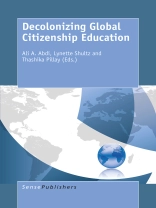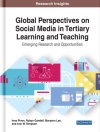The ideas for this reader came out of a conference organized through the Centre for Global Citizenship Education and Research (CGCER) at the University of Alberta in 2013. With the high expansion of global citizenship education scholarship in the past 15 or so years, and with most of this scholarship produced in the west and mostly focused on the citizenship lives of people in the so-called developing world, or selectively attempting to explain the contexts of marginalized populations in the west, the need for multidirectional and decolonizing knowledge and research perspectives should be clear. Indeed, the discursive as well as the practical constructions of current global citizenship education research cannot fulfill the general promise of learning and teaching programs as social development platforms unless the voices of all concerned are heard and validated. With these realities, this reader is topically comprehensive and timely, and should constitute an important intervention in our efforts to create and sustain more inclusive and liberating platforms of knowledge and learning. This collection of cutting-edge theoretical contributions examines citizenship and neo-liberal globalization and their impacts on the nexus of the local and global learning, production of knowledge, and movements of people and their rights. Case studies in the collection also provide in-depth analysis of lived experiences that challenge the constructed borders, which derive from colonial and imperial re-structuring of the contemporary world and nation-states. The contributors articulate agency in terms of both resistance and proactive engagement toward the construction of an alternative world, which acknowledges equality, justice and common humanity of all in symbiosis with the social and natural environment. It is a valuable reader for students, scholars, practitioners, and activists interested in the empowering possibilities of decolonized global citizenship education. NDr
Table des matières
Acknowledgements.- Decolonizing Global Citizenship: An Introduction.- Decolonizing Global Citizenship Education: Critical Reflections on the Epistemic Intersections of Location, Knowledge, and Learning.- Ubuntu, Indigeneity, and an Ethic for Decolonizing Global Citizenship.- Global Citizenship Education: A Skillful Version of Social Transformation.- Evil in Citizenship Education.- Decentring the Myth of Canadian Multiculturalism: A Post-Structural Feminist Analysis.- Motherhood as a Counter-Hegemonic Reading of Citizenship and Agency.- Facing Academic Minders, the Instruments of Institutional Interference in Higher Education.- Global Citizenship or International Trade?: A Decolonial Analysis of Canadas New International Education Policy.- The Oecd Neoliberal Governance: Policies of International Testing and Their Impact on Global Education Systems.- Reclaiming the Citizen and Renouncing Citizenship: A Case Study of an Arab Woman.- North-South Partnerships in Canadian Higher Education: A Critical Policy Analysis of Contemporary Discourses and Implications for Higher Education Internationalization.- Solidarity Movements and Decolonization: Exploring a Pedagogical Process.- Whose Knowledge is Transmitted through Public Education in Africa?.- 21st Century Learners: Economic Humanism and the Marginalization of Wisdom.- Decolonizing Albertas Educational Policies to Make Possible the Integration of Refugee Youth Learners.- Virtual Learning Environments Contributions to the Processes of Decoloniality of Being, Knowing and Knowledge Production.- Global Citizenship Education Otherwise: Pedagogical and Theoretical Insights.- Contributors.- Index.












